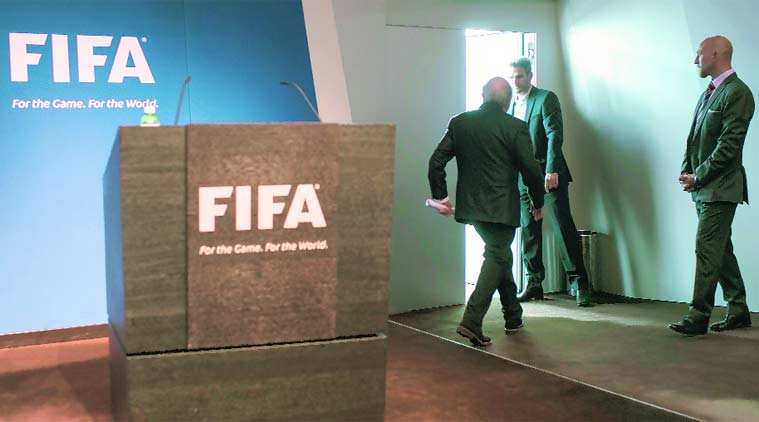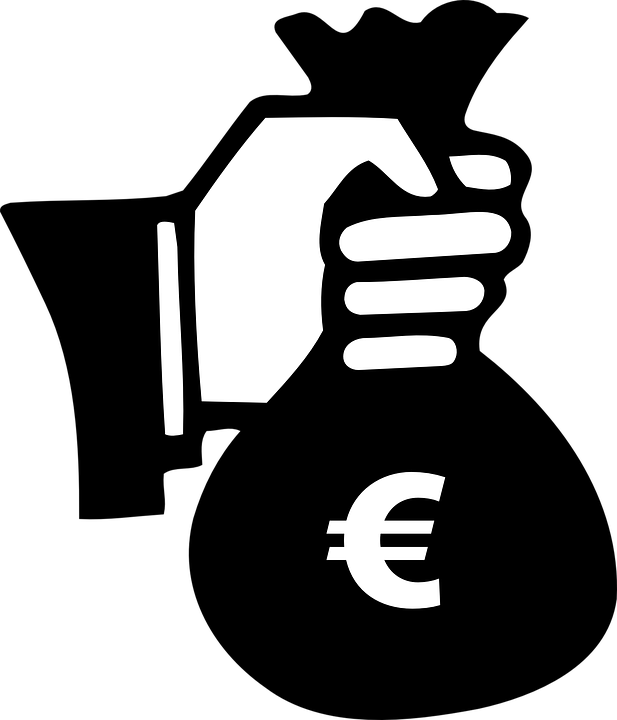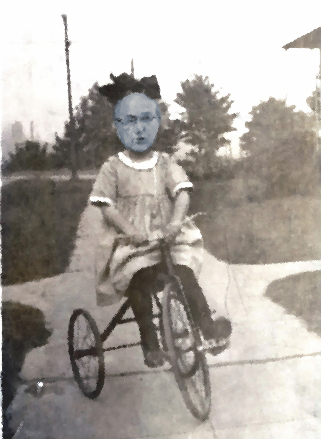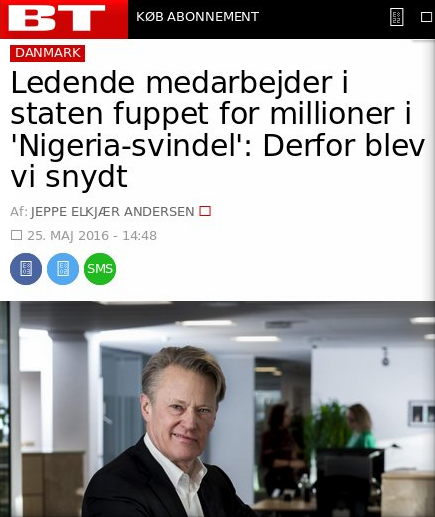05.28.16
Posted in Europe, Patents at 7:08 pm by Dr. Roy Schestowitz
English/Original
Article as ODF
Publicado en Europe, Patentes at 6:41 am por el Dr. Roy Schestowitz
No luce promisorio para la gente a la cabeza, especialmente el jefe y su mano derecha

Sumario: Las cosas no son color rosa como la calma relativa sugiere, y esperamos en las próximas semanas mayores eventos otros que la protesta en todas las sedes de la EPO a través de Europa
Las cosas se están calentando en la EPO. No se trata sólo de la historia de la bicicleta (actualizado dos veces), sino también potenciales problemas con la policía. Las fuentes nos dicen que estamos a punto de descubrir mucho más de Zagreb, donde el vicepresidente de la EPO enfrenta a cargos criminales. Como una fuente de nosotros nos puso al día, “en este momento tengo sólo unos [bits de información] verbales, pero muy fuertes de diferentes fuentes.” Se trata de los casos contra el vicepresidente de la EPO, que ha sido ocupado haciendo una montaña de un grano de arena en relación con una bicicleta, supuestamente con el fin de ayudar a justificar casi un millón de dólares gastados en la Guardia Pretoriana de Battistelli (el cuento de la bicicleta curiosamente coincidió con la reunión de presupuesto). Las actualizaciones y comentarios en nuestra cobertura original de esta revelan algunos detalles más. Hablando de la criminalidad, ver este artículo danés Jesper sobre Kongstad, Presidente del Consejo de Administración. El título dice “alto ejecutivo del estado estafando a millones en fraude nigeriano ‘: Porque somos engañados “y para dar la esencia de la misma, considerar esta traducción automatizada: “El empleado recibió un correo electrónico de una persona que decía ser el el director de la agencia, Jesper Kongstad, y en ella estaba allí que el director quería una transferencia bancaria de 6,7 millones de dólares a un banco chino para la compra de acciones de una empresa china – todo en la confianza, dijo en el mensaje”.
“Se trata de los casos contra el vicepresidente de la EPO, que ha sido ocupado haciendo una montaña de un grano de arena en relación con una bicicleta, supuestamente con el fin de ayudar a justificar casi un millón de dólares gastados en la Guardia Pretoriana de Battistelli (el cuento de la bicicleta curiosamente coincidió con la reunión de presupuesto).”
Seguramente esto es mala publicidad no sólo para Kongstad pero también para la EPO. ¿Cómo puede esta gente haber sido embaucadas tán fácilemente? No muestra mucho acerca de su inteligencia, ¿No es cierto?
Tres fuentes nos informaron, ambas privadamente y públicamente, acerca del cubrimiento de la televisión Italiana de la EPO. No fué demasiado favorecedor y puede haber más en el camino (informes de seguimiento). “Ahora”, nos dijo un lector, “podría ser que los autores podrían querer ver de cerca más específicamente acerca de la EPO, indagar acerca de sus actividades extrañas. Así que sigo publicando de ellos (quién sabe, tal vez eso también los puso en las pistas en el primer lugar) y que bien podría centrar parte de seguimiento de la EPO. Seguramente no hay falta de problemas.
“El programa esta actualmente todavía en el aire en streaming, precisamente la parte concerniénte a patentes, fue cortada del resto del show y también hay una completa traducción al Italiano in PDF.”
“Firmar un contrato de trabajo con la EPO es firmar un terrible, irrevocable contrato que puede dejar a uno deprimido, desempleado por años (por veto/decreto presidencial), robado (pagos legales, pensión, etc.) y en algunos casos muerto.”
Los datos de contacto se encuentran en el sitio en caso de que alguien desea enviar información para investigaciones de seguimiento.
Han sido casi tres meses que la televisión Bávara cubrió los abusos de la EPO, nos pidió removercopias del segmento relevante, y entoncesel Parlamento Bávaro se envolvió en el asunto. Esto todavían no acaba y parece haber sido iniciado por el cubrimiénto de televisión, basado en el propicio momento. La SUEPO acaba de decir que una sesión Parlamentaria en Bavaria acerca de la materia tendra lugar la próxima semana. Para citar: “El 20 de abril a principios de este año, el Comité de Asuntos Europeos e Internacionales del Parlamento de Baviera discutieron una petición urgente de la Sra Gabi Schmidt, presidente del partido” Freie Wähler “, relativa a las condiciones de trabajo en la EPO. Un breve informe de la reunión se puede encontrar aquí. El debate continuará en una sesión de pleno del Parlamento de Baviera en la tarde del 1 de junio
Mientras tanto los abogados de patentes alemanes estan apresurándo la UPC, de la misma manera que la EPO (advocacía de la UPC de nuevo o “efecto unitario”?). Basado en este nuevo tweet, escape de cerebros en la EPO es verdaderamente un problema; hay trabajo, pero personas con las habilidades necesarias no quisieran trabajar por la EPO (aquellos que saben mejor).
La EPO pregunta: “¿Quién puede aplicar para ser examinador de patentes en la EPO?”
Bueno, ¿quién querría aplicar para ser un examinador de patentes en la EPO dado todo lo que se conoce hoy en día? Firmar un contrato de trabajo con la EPO es firmar un terrible, irrevocable contrato que puede dejar a uno deprimido, desempleado por años (por veto/decreto presidencial), robado (pagos legales, pensión, etc.) y en algunos casos muerto.
Permalink
 Send this to a friend
Send this to a friend
Posted in Europe, Patents at 7:07 pm by Dr. Roy Schestowitz
English/Original
Article as ODF
Publicado en Europe, Patentes at 3:50 pm by Dr. Roy Schestowitz
¿Esperándo que sea tarde y díficultoso para rescindir este esquema antidemocráticoHoping it will be too late and too hard to rescind this antidemocratic scheme?

Sumario: La vergonzósa promoción de la UPC por parte de la EPO da otro paso adelánte mientras que venues de la prensa Europea (incluso canales de televisión) comienzan a explorar el arreglo secreto que es negociado por los abogados de patentes (con clientes corpórativos) y las oficinas de patentes, no el público o cualquier grupo que represente los intereses del público en general
Máscalbildeo por la UPC nos alcanzó ayer temprano. Esta clase de cabildeo (totalmente antidemocrático y por una entidad que no rinde cuentas a nadie que se considera a sí misma arriba de la ley) salía del departamento de relaciónes públicas de la EPO. La UPC y la EPO deberían ser vistas inseparablemente cada vez más. La gerencia de la EPO está tratándo de cambiar el sistema a favor de largas corpóraciones (que inclusivemente no son Europeas), claramente a perjuicio de los ciudadanos Europeos, examinadores de patentes, miémbros del jurado, etc. El público se dará cuenta de ello tarde o temprano, así como se dió un encontronazo con la ISDS y lo que realmente significa para los ciudadános ordinarios, en oposición a las grandes corporaciónes (corporaciónes globales pueden llevar a juicios a gobiernos en el extranjero, i.e. reclamar pagos por ciudadanos en el extranjero por supuestas pérdidas debido a políticas/representates).
“La gerencia de la EPO está tratándo de cambiar el sistema a favor de largas corpóraciones (que inclusivemente no son Europeas), claramente a perjuicio de los ciudadanos Europeos, examinadores de patentes, miémbros del jurado, etc.”
Estamos viendo más acerca de la UPC en la prensa. Su cobertura en Italia, por ejemplo, fue mencionada aquí a principios de este mes. Un lector nos dijo que “un programa de la televisión italiana [en] las patentes y la EPO ha cogido un poco de atención e incluso algún tipo de reacción alarmante. Hasta el momento sigue siendo todo ello bajo el radar, pero se conocen los autores de la serie para el seguimiento de sus investigaciones de forma coherente. El programa (15 de mayo) tenía sólo una parte significativa de la EPO y su comportamiento oscuro, incluso un examinador consiguió entrevistado de manera anónima, pero ha estado informando principalmente en el desarrollo perverso en lo que las patentes en general se han convertido, incluyendo una visión crítica de la UPC. Así que, en general, la EPO se mantuvo una parte importante del programa, pero no su objetivo principal. “
Puede haber más próximamente, no sólo de la televisión nacional italiana. ¿Hasta qué profundidad los periodistas van a cavar y qué van a decir al público acerca de la UPC? La EPO está presionando Italia por que es bastante difícil para ratificar la UPC (Italia es desde hace mucho tiempo una espina en el lado de la UPC) y hay algunos informes dudosos sobre la materia.
“¿Nécesita el público saber más antes de llevar la batalla a las calles de EuropaDoes the public need to know more before taking the battle to the streets of Europe?”
Bristows LLP staff, mientras tanto, continúa con el waripoleo de la UPC. No hay sentido de verguénza en cuando se trata de sus propios intereses (es como promover/trae para adentor la TPP y la TTIP, excepto que no muchos ciudadanos Europeos saben algo acerca de la UPC). Suficiéntemente gracioso, abajo en los comentarios, parece como si un abogado de patentes explica porque la UPC es problemática y no tiene sentido alguno.
¿Es tiempo de acabar con esto? ¿Nécesita el público saber más antes de llevar la batalla a las calles de Europa? No hemos venido anunciando esto por años y si nosotros – los principales afectados – no nos manifestamos ahora, nos jodemos a nosotros mismos y a nuestras futuras generaciónes. Hay más por venir de los medios y tal vez de algunos grupos activistas (eso esperamos), así que sintonizenos.
Permalink
 Send this to a friend
Send this to a friend
Posted in Europe, Patents at 7:05 pm by Dr. Roy Schestowitz
English/Original
Article as ODF
Publicado en Europa, Patentes at 3:12 pm por el Dr. Roy Schestowitz

Sumario: Algo de información tras las cortinas y una detallada explicación de la dependencia finánciera sistemática, creada por Battistelli a un costode €13 millónes o más, la cuál evita una efectiva supervisión de Battistelli
EL PRESIDENTE de la EPO no es exáctamente un modelo de gerente. Es tan áltamente aborrecido que ahora cree que necesita rodearse a sí mismo de una Guardia Pretoriana (mientras miente a la prensa acerca de sus relaciónes) y gente que trabaja alrededor de él alega que ahora él esta comprando votos por apoyo (0% de los empleados encuestados actualmente lo apoya/soporta), habiéndo alegadamente haber hecho eso desde hace mucho tiempo. Seguimos escuchándo lo mismo contínuamente de varias fuentes, algunas más confíábles que otras (como las anónimas).
“Seguimos escuchándo lo mismo contínuamente de varias fuentes, algunas más confíábles que otras (como las anónimas).”
¿Está Battistelli cavándo su propia tumba? ¿Términara esto de alguna manera mejor que el asunto Bygmalion? Para resumir los datos recabados, hubo una discusión más reciente sobre la relación entre la EPO y su Consejo, es decir, los estados miembros. Se señaló que los estados miembros más grandes, por ejemplo, Alemania, Francia y el Reino Unido, o los estados miembros económicamente más desarrollados como Suiza, están tradicionalmente solicitando y recibiéndo más patentes. Esto es lo que todo el mundo debería esperar, pero ¿cómo que realmente escala cuando se trata de la representación? Suiza puede tener una voz igual a la del Reino Unido? Y qué decir de Croacia? ¿Importa más que Alemania? Bajo Battistelli, una mentalidad que adoptó desde su paso por la ENA, nada de esto importa realmente; la principal, si no único interés de la EPO está emitiendo como muchas patentes como sea posible a fin de recibir una gran parte de las tasas anuales. Pero entonces también existe la dimensión de la fidelidad, sobre todo ahora que Battistelli corre el riesgo de perder su trabajo y la UPC está en juego (naciones votan por ella o votan para ratificarla/rechazarla).
“La fecha es 2014 así que esto es una política de Battistelli).”
Existe una división o una disparidad cada vez mayor cuando se trata de los estados miembros y también cuando se trata de los solicitantes de patentes y sus supuestos representantes (o delegados). La política en este nivel es prácticamente irrelevante para la gran mayoría de los estados pequeños, ya que tienen muy pocas patentes designadas a sus ciudadanos, pero tienen otras cosas que se pueden obtener, aparte de favoritismo en el proceso de examen de la patente. Sus delegados, como era de esperar, trabajan para sus oficinas de patentes nacionales (compañeros / amigos) y para sí mismos, no para los ciudadanos comunes, especialmente en los países donde la corrupción es rampante. Por lo tanto, estos delegados son probablemente los más interesados en la propuesta “cooperación” de la EPO. En este contexto, como notamos hace unos años, vean este documento de la EPO [PDF] (“Mapa de Co-operation actualizaciónes y mapas” sometido por el “Presidente de la Oficina Europea de Patentes”). Hemos hecho version HTML de ella (muchas gracias, Marius Nestor) en caso que la EPO desaparezca la ‘evidencia’ en un próximo futuro. La fecha es 2014, así que esto es política de Battistelli. Que conveniénte manera de ‘comprar’ la lealtad de sus miémbros.
Mencionamos este punto de vista hace dos años en relación con algunos de los asuntos del tema Željko. Este documento como una lectura cuidadosa méritos enteros. El presupuesto total que nos ocupa es, al menos, como suele ser el caso en la EPO, 13 millones de €. Ahora, recordar a los delegados, que son típicamente jefes de las oficinas nacionales de patentes (con muy pocas y raras excepciones). No hay casi medio millón en juego para todos y estas son las personas que asisten a las reuniones del Consejo de Administración. Con tanto dinero en la mesa, quiéns quieren poner en peligro el dinero invocando la ira de Battistelli? Para las naciones grandes/afluentes este dinero se puede ahorrar, pero ¿qué pasa con las naciones pequeñas y/o pobres? Algunos de ellos tienen un menor número de controles que ayudan a combatir la corrupción, por lo que la tentación es alta. Si los delegados pueden decidir la cantidad de sus oficinas nacionales de patentes obtienen en dinero de cooperación, entonces hay una gran presión sobre ellos, incluso desde dentro de las oficinas nacionales, para apoyar a Battistelli. Tales cadenas financieras no deben haber existido en primer lugar, como en este caso tenemos la dependencia económica mutua, lo que pone en peligro las tareas de supervisión/vigilancia. Para algunos de los estados más pequeños que no se preocupan mucho acerca de las patentes (o tienen muy pocas patentes en la EPO) se trata de una gran cantidad de dinero, lo suficiente para comprar su silencio o la complicidad. El pase de dinero se disfraza más (hizo más difícil de rastrear) porque es parte de los acuerdos bilaterales que no son del todo transparentes. previamente escribimos sobre otros ‘endulcantes‘ potenciales, tales como el cuidado dental, pero dejemos eso de lado por ahora como el valor total de que es mucho menor que el presupuesto per-nación (un promedio de alrededor de 350 k € para cada país).
“El pase de dinero se disfraza más (hizo más difícil de rastrear) porque es parte de los acuerdos bilaterales que no son del todo transparentes.”
¿Cómo es que sea posible que haya una supervisión adecuada? Todo está básicamente podrido y Battistelli puede salirse con la suya en todo lo que haga, incluso violar la ley, despedir los representantes del personal, y provocando una “crisis”, según la Junta 28. No debería ser tan sorprendente que el personal de la EPO no puede soportar Battistelli y sus delegados, especialmente los de las naciones pequeñas, quienes se la chupar a Battistelli. Al parecer, hay más por venir en este frente, ya que el trabajo se ha hecho para destacar tales injusticias. Bueno, “en primer lugar,” dijo una persona, “Es cierto que la representación del personal en su capacidad reducida drásticamente está muy ocupado o, mejor dicho, mantenido ocupado por un gran activismo en varios frentes, como las directrices de investigación revisando, directrices disciplinarias , seguro de salud, las encuestas más de encuestas para medir la obvia presumiblemente”.
En cuanto al por qué “, en efecto, nada concreto realmente ha sucedido todavía” entendemos que: “Si bien es loable para tratar de arreglar todo lo que se ha roto en los últimos años, tratando de pretender que esto se llevará a cabo en unos pocos meses puede verse como poco realista o que carecen de buena fe. La línea de fondo es que la representación del personal no puede informar de cualquier signo positivo ni interés genuino en la fijación de las reformas del pasado en el interés del personal y de la organización. Huelga decir que no hay cambios efectivos que se hayan propuesto hasta ahora”.
No nos esperábamos mucho que suceda hasta que la próxima protesta, pero podríamos saber si dos representantes del personal recuperarían su trabajo (cosa que dudamos) o conseguir volver a su posición anterior. Por el momento, ya que una persona señaló esta semana en IP Kat
Restricciones de confidencialidad son una cosa, limitaciones a la libertad de elegir su propio empleo es una cuestión completamente diferente.
Un empleador podría razonablemente tomar medidas para evitar el uso indebido de la información confidencial obtenida por un ex-empleado. Sin embargo, para un empleador para imponer una “prohibición” de un ex-empleado de tomar un nuevo empleo con ciertas organizaciones representa una violación de las libertades civiles de que el ex-empleado. Tales infracciones se permiten típicamente o no, o, si se ha definido con precisión en un contrato de trabajo de una manera que sólo protege los intereses legítimos del empleador (y no más), se permitirá únicamente para una duración muy limitada – desde luego no más de 1 año . Sin embargo, incluso en estas circunstancias excepcionales, lo que está permitido es raramente una “prohibición” total de su entrada en un nuevo empleo, pero con mayor frecuencia una limitación (de corta duración) sobre las actividades permitidas (por ejemplo, la prohibición de ponerse en contacto con ex-clientes) de el ex-empleado en su nuevo papel.
Si un empleador quiere que su empleado no asumir un nuevo papel para un período determinado después de entregar su cargo, entonces tienen que pagar para quedarse en casa (es decir ponerlos en la llamada “licencia jardín”).
¿Cuáles son las propuestas concretas de BB? Recuerdo que se menciona un período de 2 años, pero que parece muy por encima (sobre todo si esos 2 años no se pagan licencia jardín). Y existe una definición precisa de lo que “prohibiciones” pueden ser impuestas y por qué razones? Además, ¿hay alguna posibilidad de discrecionalidad en cómo o si se imponen las “prohibiciones”? Si es así, ¿hay pesos y contrapesos que impiden dicha discreción de manera abusiva?
Por último, quiero señalar que ha habido varias referencias a BB “comprar” votos, en la CA de algunos de los países “más pequeños”. Esta táctica sería sin duda una respuesta “política” para la revisión que se encontró en BB en la última reunión de corriente alterna. Sin embargo, hay alguna evidencia real de tales tácticas maquiavélicas ser empleado? Si es así, ¿podría contar como causa de despido inmediato?
Así que Battistelli este ‘comprando’ votos en el Consejo Administrativo tenga poca evidencia, excepto algo como lo de arriba (y los artículos citados). “Si es así,” el comentardor enfatiza, esto “¿Podría contar como causa para despido inmediato?”
“Así que Battistelli este ‘comprando’ votos en el Consejo Administrativo tenga poca evidencia, excepto algo como lo de arriba (y los artículos citados).”
¿Quien podría estar detrás del despido de Battistelli? ¿Los delegados que quisiéran que Battistelli les envíe dinero? He aquí el último párrafo completo: “Finalmente, noté que hay varias referencias acerca de BB “comprando” votos en el CA de algunos de los países “pequéños”. Talt táctica ciertamente sería un respuésta “politica” al arreglo en el que BB se encontró a sí mismo en la última reunión del CA. Sin embargo, ¿hay alguna evidencia de que tales tácticas Machiavellian esten siéndo empleadas? Si es así, ¿podría eso contar como pruebas suficiéntes para su despido inmediato?”
Varias respuestas fueron públicadas, incluyendo:
escucha compañero, todos sus argumentos ilustrados aquí nos explican cómo todas estas normas que están vigentes por BB en la Oficina Europea de Patentes nunca podrían estar en el … – voy a decir, la sociedad civil: ¿por qué no se los pone en una carta y enviarlo al representante de su país en el Consejo de Administración?
Ya sea porque él/ella es tan tonto como se obtiene a él/ella no le importa un comino lo que suceda en la Oficina de Patentes Europea – siempre y cuando el dinero sigue fluyendo.
¡Gracias!
Sí, podría ser una razón para despedir el señor BB ….
¡Pero! Su immunit sólo puede ser levantada por el AC.
Las medidas disciplinarias sólo pueden iniciarse y decididas por el aire acondicionado.
Cualquier decission al fuego, reemplazar, enviar en “suspensión jardín” con sueldo, … del presidente de la OEP sólo puede ser tomada por el aire acondicionado.
Las mismas personas que, o bien votan sí porque quieren que el dinero para su país / oficina, o porque “somos un solo voto, a pesar de ser uno de los tres grandes”.
Hubo un tiempo, no hace mucho tiempo, en el que era estándar diplomático para no votar en contra de los “grandes países”, especialmente no en contra de los países de acogida.
BB jugado esa carta, empujando a los más pequeños para mostrar un “no le gusta y votar por despecho contra usted” voto.
Lo que hace el Hoge Raad holandés? La situación actual muestra que no pueden esperar a que el problema a resolver en sí, witho la SUEPo haber sido destruido. Ellos están facilitando la “Justicia denegada” tomando su tiempo ….
El gobierno holandés se está en una situación muy difícil aquí por no exigir más respeto de los otros estados miembros, que superar en votos a los Países Bajos y contando los Países Bajos para negar a los ciudadanos sus derechos holandeses cuando van a trabajar.
Noten el argumento acerca de las naciónes grandes aquí. Heiko Maas, responsable por la nación más grande, es críticado en este comentario el cual dice: “No olvides a la política comadreja de Berlin who predica al mundo que no deberíá haber una “aspiradora política” en la FIFA. Pero cuándo se trata de la EPO donde él gana un ingreso anual de millónes él se queda mudo.”
Maas ha estado recibiéndo muchas cartas de los empleados de la EPO y sus abogados, pero él no responden ningúna. Empedrado total. Que vergonzoso para Alemania! ¿Importa la justicia en alguna manera o es simplemente dinero y mezquinos intereses egoístas?
Permalink
 Send this to a friend
Send this to a friend
Posted in Asia, Law, Patents at 10:39 am by Dr. Roy Schestowitz

Summary: Both an Indian activist-lawyer and a widely-recognised author from the US explain to Indians why over-reliance on patents — and acceptance of patents on software in particular — is a very bad idea
Software patents refuse to die for good in India. We have seen for nearly a decade now how companies including Microsoft and IBM try to impose software patents on India, either directly or indirectly.
It should be obvious to Indians who would really benefit from software patents on India. For those who are not sure yet, a very good article from Mishi Choudhary (as usual) has just been posted in the Indian media (in English) and here are some portions of her argument:
If mathematics were patentable, there would be less mathematical innovation. Only those who are rich enough to pay royalties, or those who benefited from government subsidies, or those few who were willing to sign over the value of their ideas to someone richer and more powerful than themselves, would be permitted access to the world of mathematical ideas.
Theorems build upon theorems, and so the contributions of those who could not pay rent – and all the further improvements based upon those contributions – would be lost.
For more than a quarter century, beginning with a few stalwart thinkers and exponentially increasing in size and influence, a movement to build computer software by sharing – for software to be studied, improved, and shared again – has revolutionised the production of software around the world.
[...]
Free software operating systems now power everything from cellphones to home appliances to supercomputer clusters. There is no major or minor computer hardware architecture, no class of consumer electronics, no form of network hardware connecting humanity’s telephone calls, video streams, or anything else transpiring in the network of networks we call “the internet” that doesn’t include free software.
[...]
If you believe in innovation and not monopoly of ideas, join us in our battle against software patents. SFLC.in has been leading the efforts in India to protect the software industry and the start-up ecosystem from the dangerous implications of patenting software. Despite the government of India’s extremely clear stand on the issue; we are facing pressure from incumbent old software giants, multinational corporations and lawyers.
Software patenting is not in the Indian national economic interest. “Software”, as Bill Gates used to say, “is an IQ business”. When non-Indian firms can get software patents in India, the effect is to hobble the Indian IQ advantage. All we will get is floodgates of litigation and money to be made in exchange of lawyers’ time; no wonder we are facing resistance from other lawyers in our community.
As research reports on the subject show more than 90 per cent of software patents awarded in India, before the rectification imposed by the new guidelines, were issued to foreign corporates. Patenting software makes no more sense than patenting mathematics, which is why the Patent Act Section 3(k) says what it does.
The government of India should stick to its Digital India and Make in India agendas, which do not need the crutches of a broken patent system.
The following very good article from Mike Masnick (also well explained/argued, as usual) was published last night to remark on India’s (or the government of India’s) false perception about patenting, noting:
As India has been revamping its patent policy, there had been some serious concerns about broadening patent subject matter eligibility to include software and business methods. Earlier this year, however, the Indian Patent Office clarified that it would not allow patenting of just straight software patents. And that’s good.
But, it appears that that overall push to expand patents in India is still on a dangerous path, based mainly on some longstanding, but flat out incorrect, myths about patents and their impact on innovation. That link is to a story by Anubha Sinha, noting that it’s clear that the new plans are designed to benefit giant corporations at the expense of the public, in part by sticking to the myth that if patents are good for innovation, stronger patents must be better — ignoring that restricting the rights of the public has a real cost.
[...]
This is unfortunate — and it’s also a reason why I’ve argued we need to move away from calling them “limitations and exceptions” and towards what they actually are: the public’s rights. The intellectual property laws, themselves, are “limitations and exceptions” on the public’s right to use these things.
Unfortunately, when you don’t have much experience with these issues, and you just think that all patents are good and spur innovation, you miss out on how much damage to innovation and the public can be done with a patent regime that goes too far in restricting the public’s rights.
The other big myth is that “patents = innovation.” As we’ve noted for years, a rather unfortunate fact is that politicians (and, too often, academics) without a way to accurately “measure innovation” fall back on the easiest thing they can do: count patents. But the number of patents is not a proxy for innovation and in fact is quite misleading. But, because patents are countable, it becomes a metric that everyone keys off of. And we’ve covered how China, for one, has recently embraced a massive increase in patenting, proclaiming to the US that it’s no longer a “pirate nation.” But, of course, in the process, it’s turned into a giant patent troll, using those patents to punish foreign competitors. But the actual patents that China has been getting, even as the numbers go way up, have been mostly junk.
India now makes a lot of the world’s software, so if we can keep software patents out of India, developers everywhere would benefit. █
Permalink
 Send this to a friend
Send this to a friend
Posted in Microsoft, Vista 10 at 10:22 am by Dr. Roy Schestowitz

Summary: In spite of malware-inspired tactics that should land Microsoft in courts of law all around the world (as a defendant), Microsoft-friendly circles pretend that the company fights for people’s rights like privacy — all this when Microsoft installs keyloggers on people’s PCs without their consent and obviously against their will
“Microsoft fights for your privacy” should sound as perverse as “BP fights for the environment” (or puppies) and “the Mafia fights for justice,” but in spite of Microsoft’s close relationship with the NSA some rights groups help Microsoft with the latest publicity stunt or show trial. One Microsoft booster even chose the hilarious headline “Microsoft is going in to bat for your privacy” (after all that Microsoft has done against people’s privacy, overtly and aggressively).
Microsoft Jack, in his typical Microsoft-promoting fashion, answers (or claims to answer) 10 quick questions about installing Windows 10 (he means Vista 10, which is technically malware) in light of the latest controversy over Microsoft’s resort to malware tactics (where X means "yes"). “Microsoft won’t back down from Windows 10 nagware ‘trick’,” said the British press two days ago:
Microsoft is hurt and disappointed that people would think it was trying to “trick” them with a confusing Windows 10 upgrade dialog that scheduled an upgrade without users explicitly agreeing to do so.
Redmond recently created a new Windows 10 nagware reminder that presented a dialog asking you to install the OS. But if users clicked the red “X” to close the dialog – standard behaviour for dispelling a dialog without agreeing to do anything – Microsoft took that as permission for the upgrade.
Nobody in Microsoft has been put on trial, as usual, for reasons we explained before. The following day we saw the Microsoft-friendly BBC (lots of former Microsoft UK staff now run it) writing about “Microsoft U-turn on ‘nasty trick’ pop-up” (they even put scare quotes around nasty trick). To quote:
Microsoft has u-turned over changes it made to a pop-up encouraging users to upgrade to Windows 10.
Users were angry that clicking the cross to dismiss the box meant that they had agreed to the upgrade.
Based on “customer feedback”, Microsoft said that it had added another notification that provided customers with “an additional opportunity for cancelling the upgrade”.
The pop-up design had been described as a “nasty trick”.
Microsoft told the BBC it had modified the pop-up two weeks ago as a result of criticism: “We’ve added another notification that confirms the time of the scheduled upgrade and provides the customer an additional opportunity for cancelling or rescheduling the upgrade.
How many people have been ‘tricked’ into installing this malware on their PC/s? When if ever will there be a class action lawsuit? Who has been held accountable? Will Microsoft claim ‘triumph’ for Vista 10 because it forced several more millions of people to have this malware installed against their will? When will people finally realise that Microsoft is not an ordinary company but a company that cheats, bribes, deceives, and so on? █
“The government is not trying to destroy Microsoft, it’s simply seeking to compel Microsoft to obey the law. It’s quite revealing that Mr. Gates equates the two.”
–Government official
Permalink
 Send this to a friend
Send this to a friend
Posted in Europe, Patents at 10:00 am by Dr. Roy Schestowitz

Summary: The latest bicycle ‘gossip’ and how it’s being used, based on expectations from EPO staff, to introduce further crackdowns on human/labour rights
THE Vice-President (one of several) of the EPO is far from a reliable person, but some in the media repeat his questionable claims without scepticism. Yesterday WIPR published “EPO’s president has bike brakes ‘cut’”, attributing this to an E-mail rather than an internal message (intranet) which we were the first (and probably only) site to publish. There were other errors in the articles, but some have been corrected. To quote the concluding words:
Tension between EPO staff and management has risen over the past couple of years as Battistelli has introduced policies that workers have been unhappy with. There have been numerous demonstrations and strikes at the office.
WIPR contacted the EPO by phone to request a comment, but the communications department said it was unable to comment on the matter until tomorrow because today is a ‘bridge’ day.
There is still no response from them based on the fact that we are seeing no substantiative updates. Well, except “UPDATE at 3.22pm: A WIPR source at the office confirmed that the message had been sent by Topic.” This adds nothing new. It was similar back when they were asked about legal bullying of yours truly.
Meanwhile, alluding to major protests in France, there’s a string of new comments not only in The Register but also in IP Kat. To quote some:
Maybe we should not forget that Battistelli is French. As you have probably heard in the news, France is on general strike because of new work laws. If I have understood correctly, the new law will make it easier to fire employees. A few months ago, a minister also said that he saw no reasons why civil servants should have a permanent contract. And just like Battistelli salary is a scandal, the salaries of managers is presently a scandal in the French press.
Maybe this is also the future of the Office: examiners on 2 years contracts, automatically fired at the end of the period and prevented to work afterwards. After a year of unemployment without benefits, they would be glad to sign for another two years fixed period, at a reduced salary. Seems like a win-win situation for Battistelli.
In the context of this hypothesis, I see no reason why European patent attorneys would enjoy a lifetime license, BTW. Maybe they will also need to reapply as a representative every two years as well.
To which the response was:
“As you have probably heard in the news, France is on general strike because of new work laws.”
That would never have happened if Hollande had followed the example of “President” Battistelli and enacted new strike laws.
On yer bike !
(But make sure to check the brakes first …)
Lastly:
An article in the Register about the “Bike Affair” at the EPO:
Euro Patent Office prez’s brake line cut – aka how to tell you’re not popular
http://www.theregister.co.uk/2016/05/26/epo_battistelli_very_unpopular/
There are about two dozen comments there (in The Register). People generally view this whole “Bike Affair” as more of a joke than a cause for concern. This has attracted more negative publicity than it garnered sympathy. Whenever people like Battistelli and his right-hand man are mentioned in the media it’s guaranteed to squander public sympathy and merely increase resentment from EPO staff. Now that things get more complicated for Battistelli’s right-hand man there’s hope that concrete action is not too far away. Will Battistelli be sacked in a few weeks? Here is why he should be, unless he ‘bought’ enough support (as widely alleged). The EPO is one heck of a catastrophe these days and unless changes are made at the top, it will certainly get only worse — and fast! There’s another big protest coming soon, across all EPO sites. What will it take for the Board and the Council to see how to end this "crisis" (as they called it)? Battistelli's six bodyguards are costing a fortune and giving him a few millions to walk away early (as Manchester United just did with Van Gaal) would definitely be worth it. █
Permalink
 Send this to a friend
Send this to a friend
Posted in Europe, Patents at 9:23 am by Dr. Roy Schestowitz
 Summary: An English translation of documents involving the Organised Crime Section of the Criminal Police Department in Zagreb, where the Vice-President of the EPO faces criminal charges
Summary: An English translation of documents involving the Organised Crime Section of the Criminal Police Department in Zagreb, where the Vice-President of the EPO faces criminal charges
THE other day we made public a document in Croatian. Translation of this Croatian document is now available for use, with few redactions. An English translation can be found below, but here is some background information.
The articles of the Croatian Criminal Code referred to in the document seem to be the following:
Article 340 – Treason (“Veleizdaja”)
The basis for this charge seems to be an allegation of an unlawful change in the structure of the state administration (abolition of the Copyright and Related Rights department of the SIPO) which it is claimed undermined the constitutional organisation of the Republic of Croatia.
Article 291 – Abuse of position and authority
Article 125 – Violation of equality
Article 131 – Violation of the right to work
Article 293 – Accepting a Bribe
Article 294 – Giving a Bribe
There’s more coming soon, based on sources of ours in Zagreb, who heard from people close to these matters that it would get even worse. █
REPUBLIC OF CROATIA
County State Attorney
Number: XXXXXXX
10 March 2016.
Zagreb Police Administration
Criminal Police Department Zagreb
Organised Crime Section
Please find enclosed a criminal complaint of the injured party V. S., …, Zagreb,
lodged against Ž. T., …, Zagreb and S. M. …, Zagreb for the criminal offences under
Article 340 of the Criminal Code, Article 291 of the Criminal Code, Article 125 of the
Criminal Code, Article 131 of the Criminal Code, Article 293 of the Criminal Code and
Article 294 of the Criminal Code.
In accordance with Article 206, paragraph 4, and referring to the provision of Article
206.h paragraph 1 of the Criminal Procedure Act, I order an investigation to be
carried out:
The carrying out of an interview with the applicant V.S., …, Zagreb (tel. …………..)
concerning the circumstances of the allegations of the filed appplication in which are
detailed observations concerning the exact time and manner in which the reported
Ž.T. changed the structure of the state administration in relation to Copyright and
Related Rights, for which reason is the applicant relieved from the position of
Assistant Director of the SIPO for Copyright and Related Rights, what is the amount
of material damage suffered, about what exactly is legally forbidden and undesirable
behavior, the position of the reported person in dealing with the injured party acting
without reasonable justification and without legitimate objective and based on
discrimination, as a result of which the violation of the right to work occurred
(whistleblowers) and to explain about any justified reason and the existence of which
facts about something that is or happens which could lead to legal proceedings
against the reported person, between whom, when and in which form of bribery or
corruption has taken place, what exactly was required of the official or responsible
person to whom the bribe was given, whether the reported act was carried out
independently or through an intermediary, wherein the negligent performance of duty on the part of the reported person S. M. is reflected and what kind of criminal offence in relation to the same has been committed when the specified abuse has occurred and in which manner, etc.
It is also required to carry out interviews with the reported persons concerning the
circumstances of the crimes alleged in the submitted application.
Interviews are to be carried out with other people who might have knowledge of the
offences of which the reported persons are accused.
It is also necessary to obtain from the victim all available documentation which
supporting the stated accusations (a copy of the decisions concerning the same from
the civil and criminal courts in respect of the termination of employment and criminal
offences against the plaintiff) and to obtain information from the State Intellectual
Property Office for the plaintiff with respect to the status of the persons responsible,
together with a description of jobs and tasks (contracts), a payslip that the same
received in the workplace where she worked prior to termination of employment (with regard to the question the level of material damage inflicted) as well as
documentation related to the termination of employment for the injured party V.S.
Concerning investigations or measures undertaken, you are obliged to report to me
no later than 30 days from the receipt of orders, delivering a report on what has been
done and the evidence which has been obtained.
Please also send me the official notes and statements and other material that can be
useful for the successful conduct of the proceedings.
DEPUTY MUNICIPAL STATE ATTORNEY
ANNEX:
Criminal charges et al.
Permalink
 Send this to a friend
Send this to a friend
Posted in Europe, Patents at 9:02 am by Dr. Roy Schestowitz

Summary: Jesper Kongstad, the Chairman of the Administrative Council of the European Patent Organisation, helps demonstrate that not even the EPO is intelligent enough to spot an obvious scam
JUST before the weekend we mentioned the 'Nigerian' scam (E-mail pleas for funds) that the EPO had become a victim of, which is curious as the EPO, over at its Twitter account, warns people like applicants about bogus requests for payments (while the EPO itself falls victim to that). We saw that about half a dozen times in recent months alone. Speaking of the EPO’s Twitter account, the EPO’s PR people are working weekends again (this one is from today, Saturday) and for 3 days in a row now the EPO promotes the UPC over at Twitter (not hiding the agenda and its meddling beyond its scope of authority). No sense of integrity there. We are frankly not sure who’s worse, the scammers or the EPO’s management whose abuses cost a lot more money.
“Here is the story behind Jesper Kongstad “Nigeria-Fraud”,” one person told us. It’s actually a translation of an article we mentioned the other day. “Remember this article in the Danish press,” this person asked us, “Nigeria-Svindel – Jesper Kongstad” (article in Danish).
“Well, here is the translation into English, so let’s call it the (official) story…”
The DKPTO is ended up in an embarrassing situation after a ‘managerial employee’ was tricked by a sham-mail and transferred 900.000 EUR to a Chinese bank. Even though the money were returned to the DKPTO in the end the director JK is aware that something has to happen as a consequence of the embarrassment.
On 11 May this year a ‘managerial employee’ of the DKPTO, which is arranged under the Ministry for Trade and Growth, was targeted by a so called ‘CEO FRAUD’ -sham.
The employee got a mail from a person who pretended to be the director of the DKPTO, and the mail stated that the director wanted a transfer of 900.000 EUR to a Chinese bank for purchase of shares in a Chinese company – all done with discretion.
Following that the employee had exchanged mails with the person pretending to be JK, a transfer of the considerable amount of 900.000 EUR was arranged.
Only two days later when the fake director again contacted the DKPTO in order to have another 900.000 EUR transferred to a Chinese bank, the employee became suspicious and contacted his superior who contacted the director [JK].
Internal investigation
The money were returned few days later with the help of the police and the ‘Danske Bank’. But, important damage had happened which is basis for investigation by the police and internal investigation in order to understand how the DKPTO could be tricked by what in general is known as a ‘Nigeria-mail’ – though an extremely sophisticated specimen.
Right now status is that we are in the middle of an investigation. We have lawyers working on the investigation and the police is involved. The first couple of days we were busy recovering the money but now we are going to have an investigation of how it could end up so wrong says JK to BT.
How could it happen that a managerial employee was tricked by what many knows as a sort of Nigeria-mail?
The core problem in this situation is that control can be put in place but if the employees are not sufficiently attentive mistakes can happen. Right now I focus on the personnel. Con-persons like in this case are becoming more and more sophisticated. It is possible that we should have realized that something was wrong in this correspondence, but it was carried out in a really smart way. Technically seen the resemblance was very good and the persons behind had done an elaborate job. They had written the mail in a manner similar to how I write, explains JK, who also explains that the mail was written in Danish which means that the mail distinguishes itself from most sham-mails that end up in the in-tray of ordinary persons.
We do not know who is behind
When you say that they had copied both the technical characteristics and the way you write, do you then suspect that it relates to something internal at the DKPTO or someone who knows you?
Right now the police is carrying out an investigation so I cannot say before we know more, but I do not think that it is something internal. And, we do not know who is the person behind.
What are the consequences for the managerial employee?
This is a personnel issue and I will not comment on that.
What will be the consequences for the DKPTO?
Even though we managed to have the money returned we have had a slap in the face. And, it will result in increase of control among other for transfer of money, such that in the future three signatures will be needed instead of two. I have been in contact with our IT-technicians who say that nothing can prevent mails like the one the employee received. And, it is not certain that anything can be done concerning the procedure. So, it is about the human factor where we have to improve in spotting when people try to trick us. And, these people who try to trick – not only us – are at least as skilled as we are or even better.
The key point here, the intelligence of the EPO (and DKPTO) should come under scrutiny. █
Permalink
 Send this to a friend
Send this to a friend
« Previous entries Next Page » Next Page »







 Summary: An English translation of documents involving the Organised Crime Section of the Criminal Police Department in Zagreb, where the Vice-President of the EPO faces criminal charges
Summary: An English translation of documents involving the Organised Crime Section of the Criminal Police Department in Zagreb, where the Vice-President of the EPO faces criminal charges
















 Content is available under CC-BY-SA
Content is available under CC-BY-SA